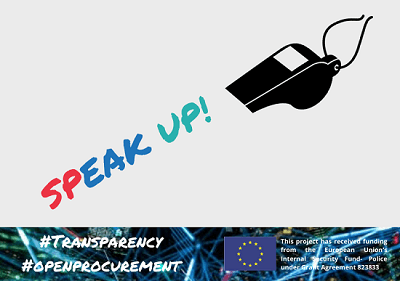Madrid, 22 January 2020- Leading transparency and anti-corruption organisations from across Europe have today released a Guide to the EU Whistleblower Protection Directive, which came into force on 16 December 2019 and must be transposed by EU Member States within two years.
The Guide explains how the EU Whistleblower Protection Directive is structured and the minimum standards of protection that countries need to include in national law. The Guide also makes recommendations on how national laws can ensure an even more comprehensive protection for anyone who exposes corruption and wrongdoing in any area of governmental activity and spending.
The Guide was produced by Access Info Europe, Civio, ePaństwo Foundation, Funky Citizens and K-Monitor, as part of the EU-funded Tenders Guru project, which aims to increase the transparency of procurement and help local watchdogs spot problems.
“Corruption in public procurement is a significant problem, estimated to add as much as 15% to the cost of publicly-funded projects across the EU,” explained Rachel Hanna, Legal Researcher with Access Info.
“It’s here that Whistleblowers play an important role, with a European Commission study estimating that protection of whistleblowers could help avoid potential losses of between 6 and 9 billion euros per year in the EU region.”
Under the new EU Whistleblower Protection Directive, people who have the courage to report corruption and other breaches of the law will receive protection. The areas of law in which whistleblowers will be protected include financial services, product and transport safety, nuclear safety, public health, consumer protection, and data protection, as well as public procurement.
“The European Union, through its directives on public procurement, has put in place measures designed to catch corrupt practices. These measures include use of e-procurement, improved record keeping, and conflict of interest mechanisms, but unlawful practices can still occur, and hence these whistleblower protections are urgently needed,” added Rachel Hanna.
The new EU-wide rules require:
- The creation of safe channels for reporting both within an organisation -private or public- and to public authorities;
- A high level of protection to whistleblowers against retaliation;
- Active and adequate information to citizens; and
- Training of public officials on how to deal with whistle-blowing.
Given that the EU Whistleblower Protection Directive only requires protection in areas governed by EU law, the CSOs that form part of the Tenders Guru project, are also recommending that EU Member States adopt broader protections covering all areas of law.
To this end, the Tenders Guru project encourages Member States to take the following measures:
- Extend the scope of protection to reports of breaches in all areas of law, both EU and national;
- Allow anonymous reporting;
- Extend protection to everyone who is at risk of retaliation as a consequence of whistleblowing;
- Ensure that all public legal entities have to establish internal reporting channels;
- Establish a duty of care for whistleblowers for those working in internal and external reporting channels;
- Eliminate the additional burden of responsibility on the complainant to receive protection against legal proceedings;
- Ensure that whistleblowers and facilitators have access to a full range of remedial measures covering all direct, indirect and future consequences of any type of retaliation;
- Establish an independent authority with sufficient power and resources for it to oversee implementation of effective reporting channels and ensure the protection of whistleblowers;
- Establish an independent authority to monitor compliance with the new rules and have the power to sanction those who have not set up an adequate system; and
- Make their annual reports to the Commission on statistics of whistleblowing available to the public.
Guide to the EU Whistleblower Protection Directive ![]()
![]()


